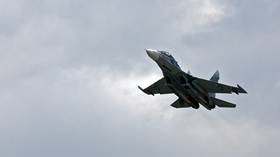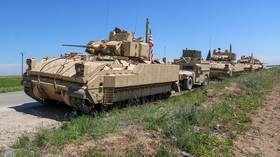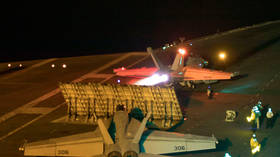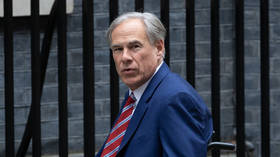Cost of policing DAPL tallied at over $22mn, N. Dakota wants feds to ‘pony up’
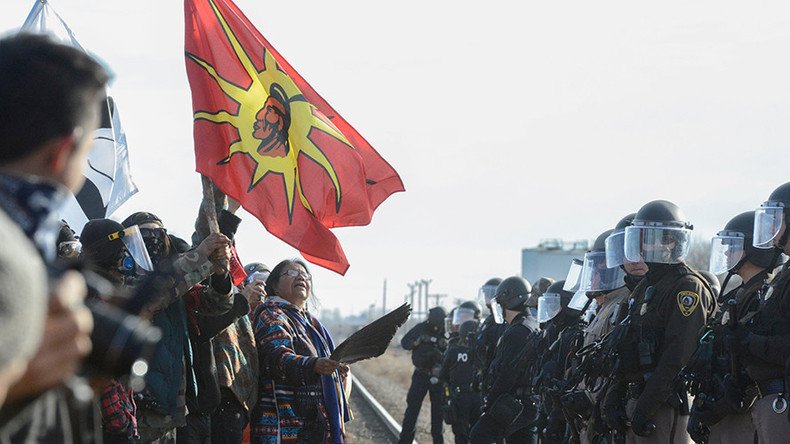
The price of policing the North Dakota Access Pipeline has been tallied at $22.3 million, a cost that North Dakota is not happy to pay.
On Monday, the Morton County Sheriff's Office released their “By the Numbers” report, which details the costs that were diverted from normal operations to respond to “illegal activity since August 10, 2016.”
[Resources/Costs] to support State/Local response to ensure public safety in Morton County & Bismarck region since Aug10/2016 #DAPL#NoDAPLpic.twitter.com/aMOxH38pon
— MortonCountySheriff (@MortonCountySD) January 9, 2017
In total, the report says that $22.3 million of state and local taxpayer funds went to supporting the policing effort, with 91 different state agencies from nine other states providing support.
The amount is $5 million more than the entire state set aside last year, and it could fund the state treasury for more than two decades.
According to the report, the money was spent on 181,232 hours of policing over a period of 153 days. In that time, 581 protesters were arrested, 94.9 percent of whom came from out of state. Of those arrested, 182 had a prior criminal record, with 25 of those having a history of violence, including any history of domestic violence or child abuse.
All of the protest-related costs were decided by the state lawmakers, but North Dakota state representative Jeff Delzer (R-8th district), chairman of the state house’s appropriations committee, says state officials want the federal government to help pay for the costs.
“We’re not happy at all that the federal government is not ponying up. This should be their responsibility,” Delzer said, the Associated Press reported. “But the fact of the matter is, until they pony up we have to cover those costs.”
In response to the protests, then-Governor Jack Dalrymple (R) issued an emergency declaration under the Emergency Management Assistance Compact (EMAC) to ask for assistance with the protesters.
The bill, which was passed by President Bill Clinton in 1996 in response to devastation caused by Hurricane Andrew, was originally intended to allow states to ask for assistance with natural disasters, not protesters.
EMAC was also used by the police in Baltimore during Black Lives Matters protests in 2016. Officers from Pennsylvania and New Jersey were sent to assist, and afterward the state of Maryland fully compensated the out-of-state officers for their time and effort.
When Indiana agreed to send officers to assist with the DAPL protests, Griffith Police Chief Greg Mance said that their agreement included payments for “all wages, overtime and cost of benefits to the officers, meals while the officers are on duty, a per diem while they are off duty, lodging for the officers during their time of stay and mileage reimbursement for the communities who sent vehicles,” according to the Northwest Indiana Times.
Assurances for payments are also laid out in a Mutual Aid and Assistance Agreement between the Morton County Sheriff's Office and the city of Grand Forks, where Morton County agreed to “reimburse the city of Grand Forks for actual expenses incurred pursuant to this agreement.”
Example of "Mutual Aid & Assistance Agreement" Morton County Sheriff signs w/ other ND agencies for #NoDAPL policing https://t.co/1TmbdYygaNpic.twitter.com/U8DsEFoMw8
— Unicorn Riot (@UR_Ninja) October 27, 2016
After months of violent clashes with the police, which were reported as “very aggressive” and caused 167 demonstrators to be injured, the $3.8 billion pipeline, which was planned to go through four different states, was put on hold.
Along with the money spent on policing, the report also details that 50 to 75 cars or structures were abandoned on the site of the protester’s camp, as well as one bull, two horses, three bison, four cows getting killed, while two cows were injured and 30 went missing.



